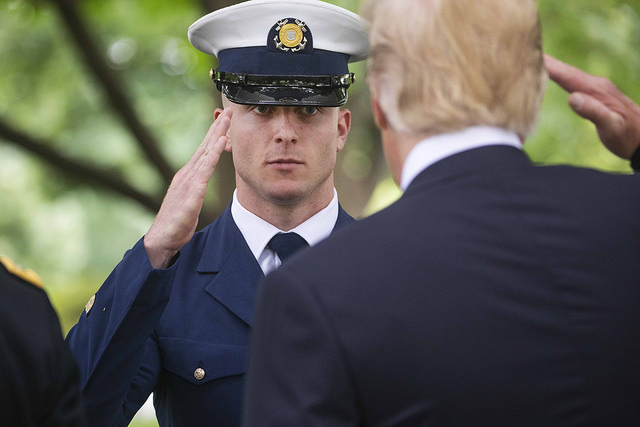In 1992, Bill Clinton did something no presidential candidate had accomplished since FDR: He won the White House without ever serving in the military.
Before Clinton, from Truman to George H.W. Bush, every U.S. president was also a U.S. veteran.
Since Clinton, only one candidate with military experience has been elected president: Lt. George W. Bush of the Texas Air National Guard.
Not only have none of the past three presidents — Barack Obama, Donald Trump, and Joe Biden — served in the military, but both Biden and Trump used dubious health claims in 1968 to avoid being drafted during the Vietnam War.
It could be argued that over the past 30 years, more draft dodgers have served in the Oval Office than war veterans. And that is not likely to change. Only one of the dozen or so announced, and likely candidates for president in either party have ever worn their nation’s uniform.
Gov. Ron DeSantis was commissioned as an officer in the U.S. Navy and assigned to the Navy Judge Advocate General’s Corps (JAG) while still a student a Harvard Law School. He was deployed to Iraq in 2007 and received a Bronze Star for his service.
None of the other announced GOP candidates — Trump, former Gov. Asa Hutchinson, former Ambassador Nikki Haley, Vivek Ramaswamy, or Sen. Tim Scott — is a veteran.
DeSantis’ military service stands out even if the list is expanded to include potential candidates like Vice President Mike Pence and Govs. Doug Borgum, Chris Christie, Chris Sununu, Glenn Youngkin, or even fringe candidates like radio talk host Larry Elder and Michigan businessman Perry Johnson.
No military service.
The same is true on the Democratic side, too. Biden’s “asthma” protected him from being drafted, and Robert F. Kennedy Jr. turned 19 just as the Vietnam-era draft ended. Marianne Williamson also did not serve in the military.
And while they have not given any (public) indication they are contemplating a 2024 race, nobody on the Democratic bench — Vice President Kamala Harris, Michigan Gov. Gretchen Whitmer, or Californians Rep. Ro Khanna and Gov. Gavin Newsom — has served, either.
Is this a political opportunity for former Navy Lt. Commander DeSantis? Or does military service no longer matter to American voters?
“Sadly, I don’t think it matters anymore, and that’s a shame in my view,” said Dr. Wayne Lesperance, political science professor and president of New England College. “There was a time when service was an absolute must.”
One reason for the change, Lesperance suggested, is the decline in the importance of foreign policy for Republican voters.
“For the GOP in particular, the foreign policy litmus tests are few and far between. They are mainly defined by focusing on the narrative that America’s traditional allies are cheating us and not paying their share.
“Military service just hasn’t been a sought-after virtue for Republican voters since [U.S. Sen. John] McCain’s candidacy,” Lesperance said.
Veteran Democratic campaign strategist Bob Shrum said the McCain example is part of an even more disturbing trend.
“Not only are voters OK with electing people who haven’t served in the military, but look at the records of those who have: John Kerry, John McCain, even go back to Bob Dole. They served abroad, but they didn’t win the White House here at home. The record is clear: military service is just not very important to the voters,” Shrum said.
That is a break with most of American political history. All but four of the first 25 U.S. presidents had military experience, and two of the exceptions were John Adams — who desperately wanted to serve in the military but was trapped by politics; and his son John Quincy, who spent much of his early life in the foreign service.
In all, 31 of the 45 men who served as president were also military veterans.
The lack of military service among Democratic candidates is not as surprising as it is for the GOP. The last Democrat with military experience to win the White House was Jimmy Carter in 1976. But what happened to the Republican bench?
It could be a coincidence, or it could be that the new populist tone of the party under the influence of Trump has shifted its stance on foreign policy. Candidates who might support a more aggressive U.S. foreign policy abroad (like West Point grad and Army veteran Mike Pompeo) are choosing not to run.
Does DeSantis’ service give him a political edge on the rest of the field? New Hampshire GOP communications expert Alicia Xanthopolous said it does.
“I think he should use it as an asset. Forget the foreign policy part and focus on his ability to understand what it means to serve, troop sentiment, and the realities of the impact of political decisions on the military,” Xanthopolous said.
It should also be a plus in New Hampshire, home to about 91,000 vets and one of the nation’s largest per-capita veteran populations.
Shrum, who ran John Kerry’s 2004 campaign and serves as director of the USC Dornsife Center for the Political Future, does not believe DeSantis’ military background can save him.
“DeSantis is one of the worst presidential candidates I’ve ever seen,” Shrum says. “He has all the personal warmth of a prune.”


